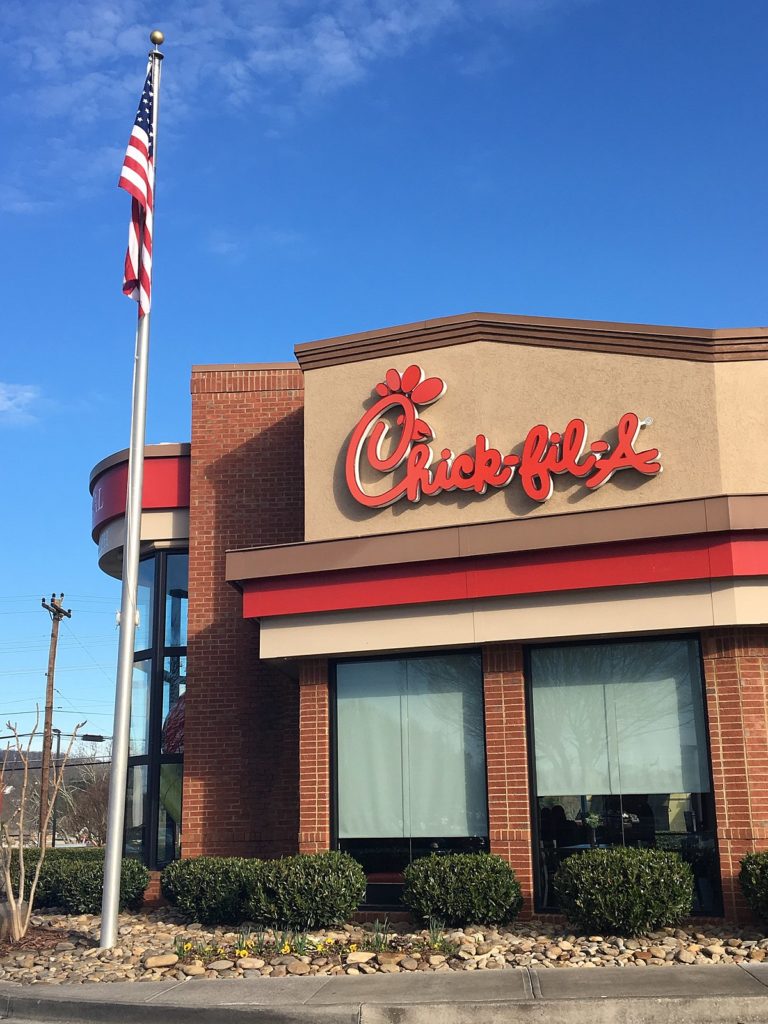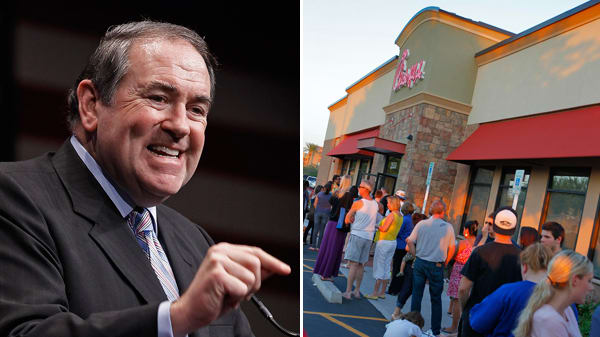Blacklisting Chick-fil-A
A popular fast-food chain becomes the target of LGBT intolerance
A condensed version of this essay appeared in City Journal on March 26, 2019 (here). Thanks to Real Clear Policy, Real Clear Politics, Real Clear Markets (here), and Instapundit (here)! And the N.Y. Post (here)! And the Dallas Morning News (here)!

Americans have grown accustomed to liberal politics afflicting cities in Democratic-controlled bastions such as California, New York, Illinois, Oregon, and Washington state. Accordingly, no one is surprised when progressive policies in places like San Francisco, New York City, Chicago, Portland, and Seattle produce disastrous urban maladies such as rampant crime, homelessness, urban blight, crippling public-employee pension debt, job-killing regulations, and high taxes. In Texas, where I live, observers have long believed that a statewide Republican majority would insulate the Lone Star State from such problems. Such nostrums are proving to be wishful thinking.
The traditionally-liberal politics of Texas’s state capital—whose unofficial slogan is “Keep Austin Weird”—were usually regarded as an exception to the statewide rule. As recently as last year, the notion of Austin, a city in conservative Texas, getting “woke” was remarkable enough to warrant a “man-bites-dog” report in these pages, entitled “Woke City.” Judging from recent events in San Antonio, the state’s second-biggest city (and ranking seventh-largest in the entire country), the Alamo City has gotten woke also, blacklisting a well-respected business due solely to the owners’ political contributions and religious beliefs.
San Antonio’s left-leaning city council, with the backing of mayor Ron Nirenberg, an activist elected in 2017, recently banned Chick-fil-A, a national fast-food chain specializing in chicken sandwiches, from becoming a concessionaire at the city-operated international airport. City officials reportedly cited Chick-fil-A’s political beliefs as the reason for its boycott of the company: “With this decision, the City Council reaffirmed the work our city has done to become a champion of equality and inclusion,” said City Councilman Roberto Treviño. “San Antonio is a city full of compassion, and we do not have room in our public facilities for a business with a legacy of anti-LGBTQ behavior.”

That is quite a serious charge. But is it valid? Is Chick-fil-A some type of corporate renegade—a rogue company that flouts the law? Not at all. Chick-fil-A is wildly successful because it offers appealing fast food and courteous service at reasonable prices. The privately-owned fast-food chain, based in Georgia, operates more than 2,100 restaurants in 46 states and the District of Columbia (including 32 outlets in the San Antonio area, employing more than 2,000 people). Founded in 1946 by a devout Christian, the family-owned chain is famously closed on Sundays.
Nonetheless, despite operating only six days a week, Chick-fil-A is so popular that it leads the fast food industry in average sales per restaurant. The company has rapidly expanded, becoming the nation’s third-largest fast food chain, behind McDonald’s and Wendy’s. Chick-fil-A operates in stand-alone locations as well as at universities, hospitals, and airports. Since 1997, the Company has sponsored the Peach Bowl, a major college football game, on New Year’s Eve in Atlanta. Chick-fil-A, in other words, is a model business. Its loyal customers love it.
The charge that Chick-fil-A is “anti-LGBTQ” is based primarily on private contributions (made through the WinShape Foundation) and statements by the company’s owners in support of traditional marriage, in some cases years ago. The city does not challenge the company’s employment practices or business policies. Prior to the Supreme Court’s 2015 decision in the Obergefell case, Texas law did not recognize same-sex marriage, so opposition to it–consistent with mainstream religious beliefs–was hardly “extreme” or improper. Nor does opposition to same-sex marriage amount to discrimination against LGBT employees or customers. Federal law (Title VII) does not prohibit discrimination on the basis of sexual orientation in any event. The company’s personnel policies conform to federal employment law, and Chick-fil-A has issued a corporate statement of respect for all people regardless of sexual orientation in an internal document called “Chick-fil-A: Who We Are.” The company’s owners are free to express their views without the threat of government retribution.
Vindictive LGBT activists have targeted Chick-fil-A for years—unsuccessfully, until now. In 2012, when LGBT groups organized a national campaign to boycott the chain for its owners’ personal views in opposition to same-sex marriage, the backlash by the company’s devoted supporters—led by former Arkansas governor Mike Huckabee–resulted in record-breaking sales. The public has demonstrated that it does not object to the owners’ allegedly objectionable positions. Yet the single-minded activists tenaciously persist.

In San Antonio, the airport boycott may also have been influenced by a recent report by the Soros-funded progressive group Think Progress criticizing the company’s corporate donations to charitable organizations described as being “anti-LBGTQ,” such as the Salvation Army, the Fellowship of Christian Athletes, and—prior to 2017—a program for at-risk young men called the Paul Anderson Youth Homes. What these benign organizations have in common is subscribing to traditional Christian beliefs. Condemning such organizations for their religious values is reminiscent of the discredited Southern Poverty Law Center’s equation of Judeo-Christian moral values with anti-LGBT “hate.” Only anti-Christian zealots would treat religious opposition to same-sex marriage as identical to racist bigotry by the KKK, neo-Nazis, skinheads, and similar groups.
The city’s black-listing of Chick-fil-A seeks to punish the company (and its owners) for espousing mainstream beliefs shared by most Americans—and, ironically, an overwhelming majority of San Antonio’s residents, many of whom are Catholics. (San Antonio, one of the oldest Spanish settlements in Texas, was named after Saint Anthony of Padua.) Unlike ultra-liberal Silicon Valley, where Google fired James Damore for expressing opinions deviating from rigid progressive orthodoxy, and where Mozilla shamefully sacked its CEO, Brendan Eich, in 2014 for having contributed $1,000 years earlier in support of California’s (successful) initiative in support of traditional marriage, San Antone’s predominately Hispanic residents are culturally conservative.
More importantly, Google and Mozilla are not subject to the First Amendment, whereas the city, as a government entity, cannot selectively punish constitutionally-protected speech based on its content. Government contracts cannot be withheld based on potential vendors’ disfavored political or religious beliefs. A slam-dunk lawsuit by Chick-fil-A is almost certain, with the city’s taxpayers footing the bill for the council’s spiteful and fool-hardy decision. Taxpayers are not the only victim of the city’s folly. Due to the exclusion of one of America’s favorite fast-food restaurants from the seven-year concession agreement just approved by the city, travelers using San Antonio’s airport will not be able to enjoy a Chick-fil-A sandwich or waffle fries.
The latest controversy, like many progressive crusades, is largely symbolic—but important for precisely that reason: When politics become a weapon in the culture war, the stakes have a tendency quickly to escalate. Winning emboldens bullies to become more aggressive. San Antonio residents have to wonder: Who does the mayor and city council represent? Think Progress, a small-but-vocal group of LGBT activists, or the voters who elected them?
































